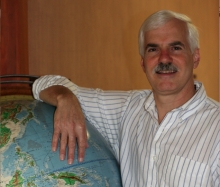August 14, 2014
Good Science Information Can Change Climate Beliefs: Empirical/Experimental Evidence and www.HowGlobalWarmingWorks.org*
Michael Ranney, University of California, Berkeley
with Matthew Shonman, Boya Shirley Hu, Lisa Zhang, & Kimberly Le
Time and Location: Monday, September 8, 2014, 3PM, KL 232, UC Merced
Abstract:
Considering 8 of our recent studies (including 7 experiments), we demonstrate that virtually no Americans know the basic climate change mechanism. In our 4 relevant experiments, we dramatically increased such understandings (thrice utilizing delayed post-tests) following 2-to-45 minutes’ instruction regarding global warming’s physical chemistry. This mechanistic learning, or merely receiving just (Experiment 6’s) seven highly germane statistical facts, also increases climate change acceptance––across the liberal-conservative spectrum. However, Experiment 7’s misleading statistics decreased climate change acceptance (and dramatically, knowledge-confidence). Such readily available attitudinal and conceptual-cognitive changes, through scientific information, disconfirm what we term “stasis theory”––which many researchers and laypeople varyingly maintain. Stasis theory subsumes claims that informing people (particularly Americans) about climate science may be largely futile or even counterproductive––a view that appears historically naïve, suffers from range restrictions (e.g., virtually nil mechanistic knowledge), and/or misinterprets some polarization and (non-causal) correlational data (Our studies evidenced no polarizations). To spur direct-to-the-public knowledge-sharing, we also discuss HowGlobalWarmingWorks.org–– a now-popular website including five short videos (from 52 sec. to 4.7 min). (For Mandarin videos/text, see HowGlobalWarmingWorks.org/Chinese.html). Finally, we also analyze public and non-public comments about the website/videos.
Speaker Bio:
Michael Ranney's research explores the nature of explanation and understanding, in both formal and informal domains. His work is intended to foster the incorporation of challenging information (e.g., on global climate change). Regarding explanatory coherence, he, his students and his collaborators study and model the nature and utility of reasoning involving both supportive and contradictory relations. They also generate curricula, methods, and software designed to improve rational thinking. Ranney's work on the representation and reorganization of scientific and societal knowledge exhibits the fragmentary nature of most lay people's knowledge––in arenas as diverse as evolution, physics, abortion, and immigration. His latest projects study mechanistic reasoning and policy-making involving socially important rates and statistics. He was a Spencer Fellow of the National Academy of Education and the Spencer Foundation, is a Fellow of the Psychonomic Society, and was a University of California Regents' Junior Faculty Fellow. At Berkeley, he is head of the Reasoning Research Group, past chair of SESAME (the Graduate Group in Science and Mathematics Education), a member of IPSR (the Institute of Personality and Social Research) and a member of the interdisciplinary Cognitive Science faculty (e.g., ICBS).

*This talk is co-sponsored by Cognitive and Information Sciences, UC Merced




